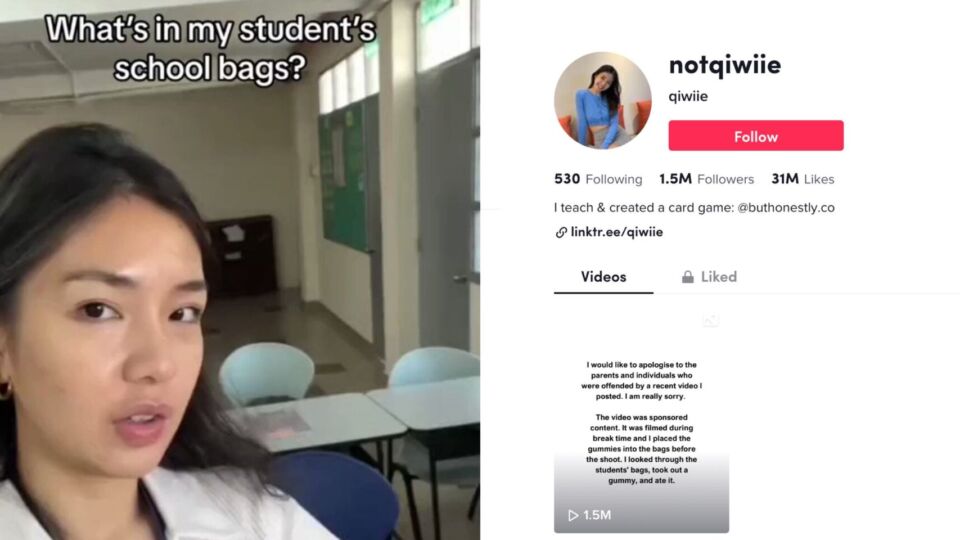Earlier this week, a tweet went viral claiming that a schoolteacher from Malaysia had secretly filmed the contents of her students’ bags without their consent and posted it on TikTok.
The now-deleted tweet tagged education minister Fadhlina Sidek and said: “YBM, I received this video via WhatsApp. The teacher is going through her pupils’ things and posted a video on this. I don’t know her profile name on TikTok, but the teacher is wearing a REAL school lanyard.”
Teachers of TikTok
The teacher in question is Shi Qi, on TikTok she is known as @notqiwiie, and specializes in creating educational content featuring her students, with the consent of their parents.
As expected, the internet was inundated with both criticism and support regarding the teacher’s actions. Some argued that while parents may have given consent, the children themselves might not agree or fully comprehend the potential impact of having their faces exposed on the internet.
Following the controversy, Shi Qi apologized and revealed that the viral video was actually sponsored content intended to promote a children’s vitamin product.
In response to the backlash, Shi Qi’s TikTok account, which had over a million followers, now only features a single video—an apology—while the rest of her content has been removed due to the uproar.
“I would like to apologize to the parents and individuals who were offended by a recent video I posted. I am really sorry. The video was sponsored content. It was filmed during break time and I placed the gummies into the bags before the shoot. I looked through the student’s bags, took out a gummy, and ate it,” the apology reads.
As someone who has viewed her content, it is evident that Shi Qi genuinely cares about her role as a teacher, and the students in her videos appear to genuinely like her.
This indicates that she has a strong connection with her students, likely facilitated by her adeptness in navigating social media and content creation.
Shi Qi is not the only teacher who has gained influence through social media. In fact, it has become quite popular for teachers to document their daily activities in the classroom or participate in TikTok trends with their students.
However, this situation raises an important question: where should the boundaries be drawn?
Students are not money-making objects
Michelle Tan, a preschool homeroom teacher at an international school in Kuala Lumpur, expressed her belief that it is commendable for teachers to document their professional lives. However, she emphasizes that it becomes problematic when students’ faces are exposed to the public.
“I think that it’s great for teachers to create content on TikTok and everything but at the same time, you also have to be responsible for what kind of content we put up on the internet,” she told Coconuts.
“I do it too, I post about my experiences as an educator on TikTok but I do not reveal their faces,” she added.
“Teachers must also exercise caution when it comes to creating content in the classroom because it can be construed as using your students to make yourself famous or monetize from it,” she said.
Protecting the kids
Michelle also pointed out the rapid advancements in artificial intelligence (AI) and the potential risks for underage children whose faces are shared on the internet.
She noted that there is a risk of their images being misused in pornographic materials.
To mitigate these concerns, Michelle ensures that she seeks permission from parents whenever she includes her students’ faces in teaching materials or assignments.
Similarly, Azhani Fisal, a 26-year-old teacher based in Selangor, shares Michelle’s sentiments.
She believes that educators must exercise utmost discretion when it comes to their students’ identities. Azhani emphasizes that teachers should prioritize their students’ well-being rather than creating content.
“Documenting our daily classroom activities is acceptable, as long as we take precautions to avoid posting or making students’ faces go viral,” she said.
“It is crucial to hide their faces, even if their parents grant permission. Children themselves may not fully comprehend how media operates and might object to their images being shared.”
“Sometimes, it is not only up to the parents to give consent; the children themselves should also be aware of what to anticipate,” she added.
She said teachers need to remind themselves that their role is not to create content but to ensure the well-being of their students.
In summary, this incident involving Shi Qi has sparked a broader conversation about the appropriate boundaries for teacher-influencers and the potential risks associated with exposing students’ identities on the internet.



